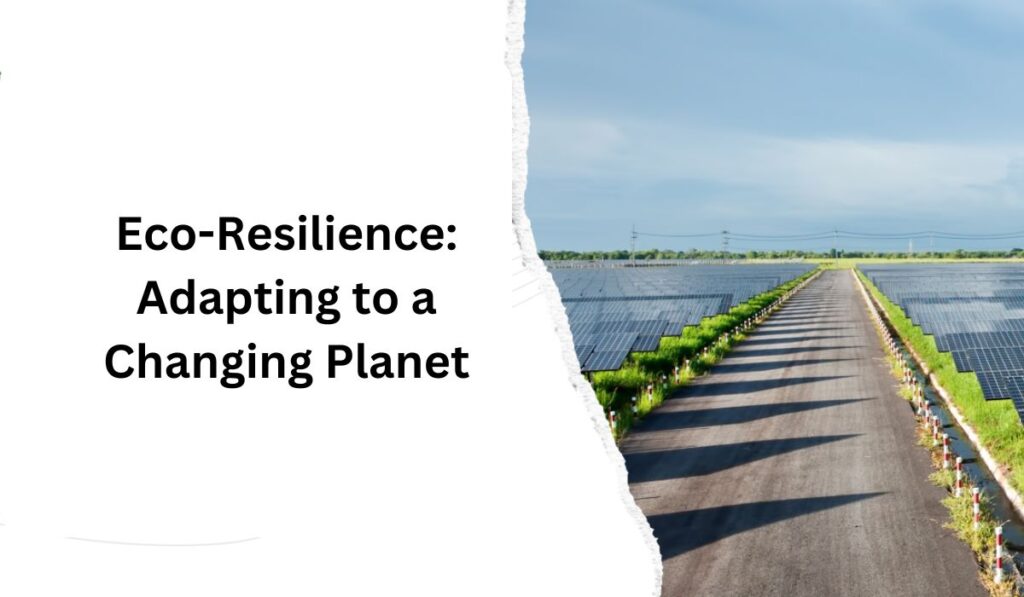In an era marked by climate change and environmental uncertainty, the concept of eco-resilience has emerged as a crucial framework for navigating the challenges posed by a rapidly changing planet. From rising temperatures to extreme weather events, human activities are driving unprecedented shifts in ecosystems worldwide. In the face of these challenges, fostering eco-resilience has become imperative for both ecological sustainability and human well-being.
Understanding Eco-Resilience
Eco-resilience can be defined as the capacity of an ecosystem to withstand and recover from disturbances while maintaining its essential structure, function, and identity. It encompasses the ability of natural systems to adapt to changing conditions, absorb shocks, and continue to provide vital services to society. At its core, eco-resilience emphasizes the interconnectedness of ecological, social, and economic systems, highlighting the need for holistic approaches to sustainability.
Building Blocks of Eco-Resilience
- Biodiversity Conservation: Biodiversity lies at the heart of eco-resilience, providing ecosystems with the genetic variability necessary for adaptation and evolution. Conservation efforts aimed at protecting species diversity and habitat integrity play a fundamental role in enhancing eco-resilience. By preserving a wide array of species and ecological niches, we can bolster the resilience of ecosystems to environmental changes.
- Ecosystem Restoration: Restoring degraded ecosystems is essential for strengthening their resilience to future disturbances. Initiatives such as reforestation, wetland restoration, and sustainable land management help rebuild ecosystem functions and enhance their capacity to recover from disruptions. By restoring natural habitats and ecosystem services, we can mitigate the impacts of climate change and promote ecological stability.
- Sustainable Resource Management: Adopting sustainable practices in resource management is crucial for promoting eco-resilience. From sustainable agriculture and fisheries to responsible water use and energy production, ensuring the sustainable utilization of natural resources is vital for maintaining ecosystem health and resilience. By minimizing resource exploitation and reducing environmental degradation, we can safeguard the long-term resilience of ecosystems.
- Community Engagement and Adaptation: Engaging local communities in conservation and adaptation efforts is essential for building eco-resilience at the grassroots level. Empowering communities to participate in decision-making processes, implementing climate-smart practices, and fostering local knowledge and innovation are key strategies for enhancing community resilience. By fostering collaboration and inclusivity, we can build resilient communities capable of adapting to environmental change.
Challenges and Opportunities
Despite growing recognition of the importance of eco-resilience, significant challenges remain in its implementation. Limited resources, institutional barriers, and competing interests often hinder efforts to promote sustainability and resilience. Additionally, the interconnected nature of global environmental issues requires coordinated action at local, national, and international levels.
However, amidst these challenges lie opportunities for innovation, collaboration, and transformative change. Advances in technology, such as remote sensing and data analytics, offer new tools for monitoring ecosystems and informing decision-making. Furthermore, partnerships between governments, civil society, and the private sector can facilitate the exchange of knowledge and resources needed to address complex environmental challenges.
Conclusion
As we confront the realities of a changing planet, the concept of eco-resilience offers a guiding framework for building a sustainable future. By embracing principles of biodiversity conservation, ecosystem restoration, sustainable resource management, and community engagement, we can enhance the resilience of ecosystems and societies alike. In the face of environmental uncertainty, fostering eco-resilience is not only a necessity but also a pathway towards a more resilient and thriving planet for future generations.


